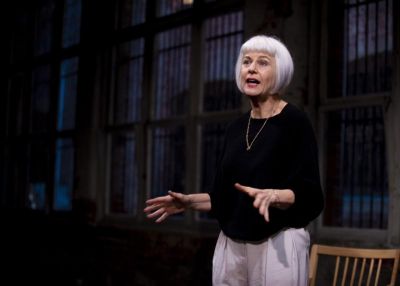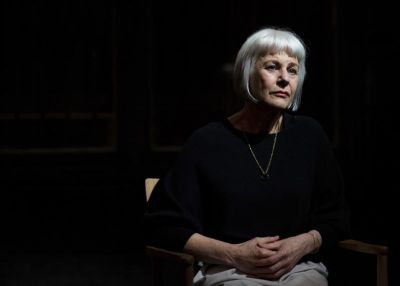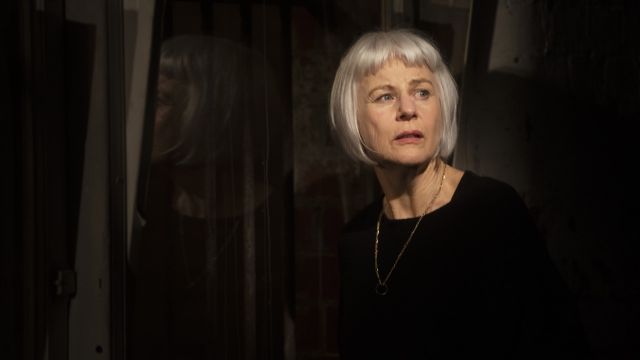The Year of Magical Thinking
Early in this eighty-five minute monologue, Joan Didion (via Jillian Murray) quotes her husband, John Gregory Dunne: ‘Why must you always have the last word? ...why can’t you just let it go?’ It is a coda, repeated at the end. The irritated but affectionate questions are a key to why Joan Didion is a great writer. She has to have the last word and won’t let it go until she understands, both her subject and her own response to it. The Year of Magical Thinking is about grief - the sudden knock-out blow of grief that follows the out-of-the-blue death of her husband, and the more insidious hoping-against-hope long decline to death of her daughter Quintana Roo - both provoking ‘magical thinking’ as Didion’s irrational - while knowing that she is irrational - responses. What is ‘magical thinking’? Perhaps the simplest and now famous example is that of Didion contemplating her dead husband’s clothes. What to do with them? His shoes? No, better not get rid of them: he will need them when he comes back. Anyone who has lost a loved one will recognise that. As Didion’s text states: ‘The details will be different, but it will happen to you.’
 Director Lawrence Strangio takes a risk with material that is ‘static’ and ‘undramatic’ (as he has done with his theatrical adaptations of Marguerite Duras) - and here is yet another show in which a performer tells the audience a story. There are two saving graces here: one is the nature of the story, beautifully written, surprising, ironic, sometimes funny and startlingly insightful. It is a very serious, highly intelligent stand-up routine. Second, the story is told by Jillian Murray, who is a great actress. Mr Strangio makes it very clear in his program note that Ms Murray is not ‘impersonating’ Joan Didion; she is ‘presenting’ (and inevitably interpreting) Joan Didion’s experience and Joan Didion’s own reactions to that experience.
Director Lawrence Strangio takes a risk with material that is ‘static’ and ‘undramatic’ (as he has done with his theatrical adaptations of Marguerite Duras) - and here is yet another show in which a performer tells the audience a story. There are two saving graces here: one is the nature of the story, beautifully written, surprising, ironic, sometimes funny and startlingly insightful. It is a very serious, highly intelligent stand-up routine. Second, the story is told by Jillian Murray, who is a great actress. Mr Strangio makes it very clear in his program note that Ms Murray is not ‘impersonating’ Joan Didion; she is ‘presenting’ (and inevitably interpreting) Joan Didion’s experience and Joan Didion’s own reactions to that experience.
The mode is apparently simple. The house lights scarcely dim as Ms Murray begins - as if we are to have a friendly, no frills, natural chat. As the show proceeds, however, Andy Turner’s lighting changes are subtle and finely judged. (Darius Kedros’ sound is surprisingly - for him - distracting.)
 Ms Murray’s movements between an armchair, a table and the undressed windows to the alley outside are few, but expressive of waves of differing emotions. Her great skill is to suggest another layer beneath the words and another layer beneath that. Her representation of Didion’s story shows a woman ostensibly in control by means of irony, by being strictly matter of fact, by wryly acknowledging her ‘magical thinking’, by showing that she is pushy with the doctors and not awed by them (one calls her a ‘cool customer’). And yet she suggests the struggle to maintain control - even now, in hindsight - and at times, even if only momentarily, losing that struggle. And of course we know that in theatre and in film, we are far more moved by the character who could cry, who wants and needs to cry, but doesn’t. This is yet another fine - and, if you like, ‘magical’ - performance from Jillian Murray, aided and guided by Mr Strangio, who here shows that he knows very well that less is more.
Ms Murray’s movements between an armchair, a table and the undressed windows to the alley outside are few, but expressive of waves of differing emotions. Her great skill is to suggest another layer beneath the words and another layer beneath that. Her representation of Didion’s story shows a woman ostensibly in control by means of irony, by being strictly matter of fact, by wryly acknowledging her ‘magical thinking’, by showing that she is pushy with the doctors and not awed by them (one calls her a ‘cool customer’). And yet she suggests the struggle to maintain control - even now, in hindsight - and at times, even if only momentarily, losing that struggle. And of course we know that in theatre and in film, we are far more moved by the character who could cry, who wants and needs to cry, but doesn’t. This is yet another fine - and, if you like, ‘magical’ - performance from Jillian Murray, aided and guided by Mr Strangio, who here shows that he knows very well that less is more.
Michael Brindley
Photographer: Jodie Hutchinson
Subscribe to our E-Newsletter, buy our latest print edition or find a Performing Arts book at Book Nook.

